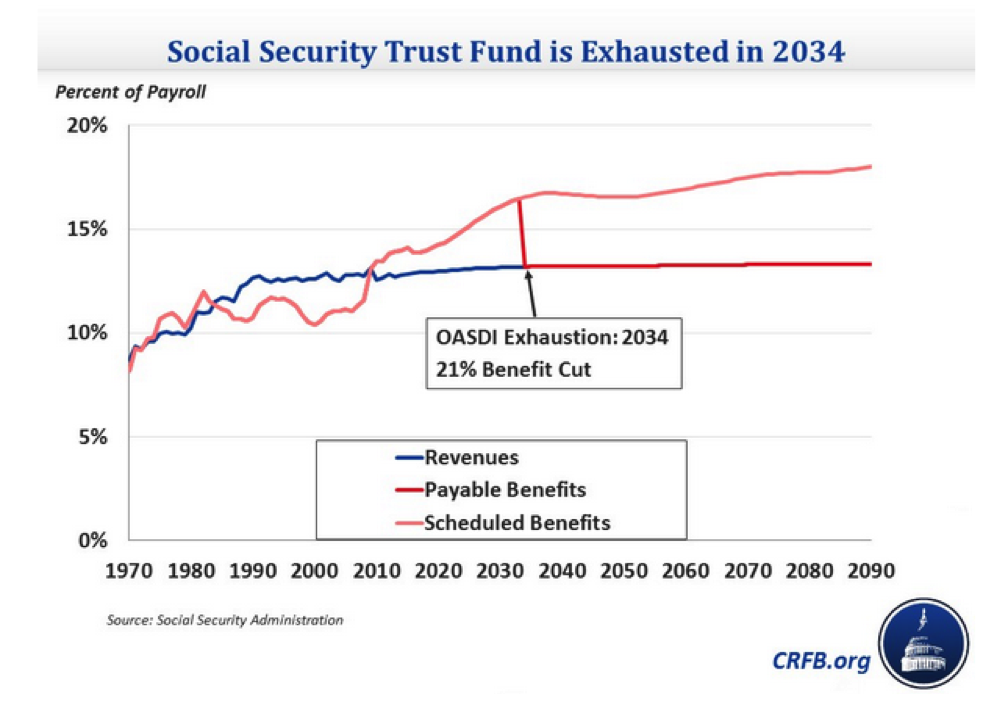On the 80th anniversary of the creation of Social Security, Americans who have been buffeted by repeated warnings about long term funding problems overwhelmingly believe that the nation’s premier retirement program is in serious trouble – with many convinced they will never draw down any benefits.
A new Gallup survey published on Thursday found that 66 percent of Americans believe Social Security is in a “state of crisis,” while slightly more than half of those still working doubt they will ever receive Social Security benefits. Not surprisingly, millennials who are much further away from retirement than their parents and elders are far more pessimistic, with 64 percent saying they are convinced they will never draw Social Security benefits.
Related: Medicare and Social Security Worse than They Look: Trustees
The Social Security Act – signed into law by Franklin D. Roosevelt on August 14, 1935 amidst the Great Depression, has long been the bedrock of retirement for tens of millions of low and middle income Americans, especially because the private savings rate of Americans has waxed and waned over the years.
A separate survey of 1,200 adults by AARP, a major senior citizen advocacy group, confirms that Social Security is at the very core of most Americans’ retirement. Indeed, 80 percent of Americans of all age groups say they plan to rely on Social Security in a substantial way or rely on it somewhat. Thirty-three percent of respondents say that Social Security is the source of income that they rely on or plan to rely on most during their retirement.
“As we celebrate Social Security on its 80th anniversary, our survey found that it remains as important as ever to American families,” Jo Ann Jenkins, the CEO of AARP, said in a statement. “We also found that although most want to continue living independently as we age, obstacles to saving often continue to occur in our lives. However, Social Security continues to help generation after generation to diminish these obstacles.”
This extraordinary dependency on Social Security by all but the wealthiest Americans helps to explain the political sensitivity of the program. Many lawmakers and public policy experts worry about the program eventually running out of money as more and more baby boomers retire, absent significant changes or cutbacks in benefits.
Related: Democrats Call for Major Change in Social Security
In discussing why they don’t save more for retirement, 69 percent of those interviewed by AARP said they have no choice but to focus on their current financial needs, while 47 percent said they don’t have enough money left over after paying their bills. Thirty-nine percent said they faced a major health need or problem in their family that kept them from saving.
The budgetary implications of Social Security are huge of what is essentially a pay-as-you go program. Workers pay Social Security payroll taxes into the program and money flows back out in the form of monthly payments to beneficiaries.
Last year, 24 percent of the total federal budget, or $851 billion, went for Social Security. The major entitlement program provided monthly retirement benefits averaging $1,329 to 39 million retired workers in December 2014, according to an analysis by the Center on Budget and Policy Priorities. Social Security also provided benefits to 2.3 million spouses and children of retired workers, 6.1 million surviving children and spouses of deceased workers, and 10.9 million disabled workers and their eligible dependents in December 2014, according to the analysis.
While most working Americans 65 or older are convinced they would get their Social Security benefits when they are ready to collect, 43 percent of current retirees predict that eventually there will be cuts in their benefits, according to Gallup. While this figure is down from 56 percent registered in 2010, it is up from 32 percent in 2005, according to Gallup.
Related: Battle Lines Form in the Fight Over Social Security Payment Reductions
Perennial warnings from Capitol Hill, fiscal watchdog groups and government officials responsible for overseeing the program help to explain the public’s angst over the future of the program, particularly when the economy fluctuates between boom and bust. The Medicare and Social Security Trust Fund trustees report in late July is a case in point.
While Medicare, the health care program for seniors, has enough money in its Hospital Insurance Trust Fund to continue paying benefits at current levels until 2030, Social Security faces a more immediate danger. The program is made up of two trust funds, one for disability insurance and the other for retirement benefits. Taken together, the two funds contain enough money or government IOUs to assure benefit payments until 2034, but they are wildly out of balance.
The Disability Insurance Fund is projected to run out of money in 2016, unless Congress and the White House approve a transfer of money between the two funds. If they don’t, benefits will be cut to 81 percent of what beneficiaries are due under current law. While lawmakers and the Obama administration agree on the need to prop up the disability insurance fund by late this year, there is broad disagreement over how best to accomplish that.
The Social Security program is attracting increased attention on the 2016 presidential campaign trail. On the Republican side, New Jersey Gov. Chris Christie would implement a major overhaul and reduction in benefits – in part by raising the retirement age – while on the Democratic side, Sen. Bernie Sanders of Vermont is leading the charge for an increase in existing Social Security benefits.
"We should not be talking about cutting Social Security benefits,” Sanders said recently while introducing a bill to boost Social Security benefits by $65 a month. “We should be talking about expanding benefits to make sure that every American can retire with dignity.”





